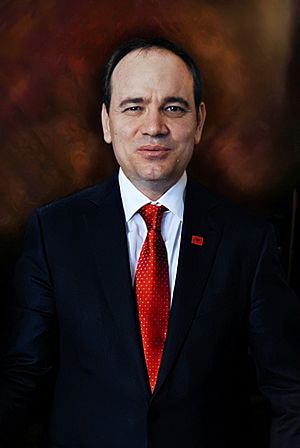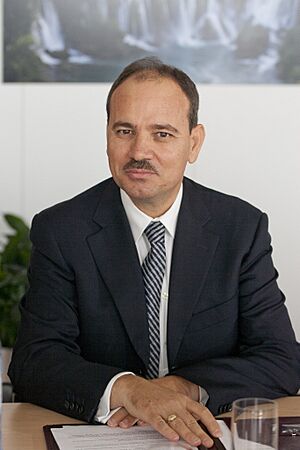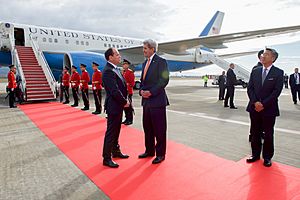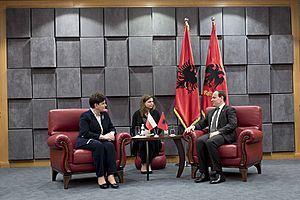Bujar Nishani facts for kids
Quick facts for kids
Bujar Nishani
|
|
|---|---|

Nishani in 2016
|
|
| President of Albania | |
| In office 24 July 2012 – 24 July 2017 |
|
| Prime Minister | Sali Berisha Edi Rama |
| Preceded by | Bamir Topi |
| Succeeded by | Ilir Meta |
| Minister of the Interior | |
| In office 21 April 2011 – 12 June 2012 |
|
| Prime Minister | Sali Berisha |
| Preceded by | Lulzim Basha |
| Succeeded by | Flamur Noka |
| In office 20 March 2009 – 17 September 2009 |
|
| Prime Minister | Sali Berisha |
| Preceded by | Gjergj Lezhja (Acting) |
| Succeeded by | Lulzim Basha |
| Minister of Justice | |
| In office 17 September 2009 – 25 April 2011 |
|
| Prime Minister | Sali Berisha |
| Preceded by | Enkelejd Alibeaj |
| Succeeded by | Eduard Halimi |
| Personal details | |
| Born | 29 September 1966 Durrës, Albania |
| Died | 28 May 2022 (aged 55) Charité University Hospital, Berlin, Germany |
| Political party | Democratic Party (before 2012; 2017–2022) Independent (2012–2019) |
| Spouse |
Odeta Kosova
(m. 1994) |
| Children | 2 |
| Alma mater | Skanderbeg Military University Naval Postgraduate School University of Tirana |
| Signature |  |
Bujar Nishani (born September 29, 1966 – died May 28, 2022) was an important politician from Albania. He was the President of Albania from July 24, 2012, to July 24, 2017.
He became president when he was 45 years old. This made him the youngest person to hold that job in Albania. Before becoming president, Mr. Nishani worked in several important government roles. He was the Minister of Internal Affairs twice, from 2007 to 2009 and again from 2011 to 2012. He also served as Minister of Justice from 2009 to 2011.
Contents
Early Life and Education
Bujar Nishani was born in Durrës, Albania, on September 29, 1966. His parents were both teachers.
He studied at the Skanderbeg Military University and finished in 1988. Later, in 1996, he studied "defense resources management" in the United States. In 2004, he earned a law degree from the University of Tirana. He also completed a master's degree in European studies in 2005.
Political Journey
After communism ended in Albania in 1991, Nishani joined the Democratic Party of Albania (DP). He started working for the Ministry of Defense in 1992. Two years later, he worked for the Ministry of Foreign Affairs, focusing on relations with NATO.
In 2001, he became a leader for the Democratic Party in Tirana. In 2003, he won a seat on the Tirana Municipal Council. He continued to rise in the party's leadership.
Nishani was elected to the Albanian Parliament in 2005 and again in 2009. He served as Minister of Interior from 2007 to 2009, and again from 2011 to 2012. He was also the Minister of Justice from 2009 to 2011.
Becoming President
On June 10, 2012, the political parties in Albania were trying to choose a new president. The previous votes had failed. Bujar Nishani, who was the Minister of the Interior at the time, was suggested as a candidate.
The next day, he was officially proposed for the role. In the Parliament, Nishani won with 73 votes. He was supported by the ruling party. The opposition party did not vote. He officially became president on July 24, 2012. In his first speech, he said his main goals were to improve the justice system and help Albania join the European Union.

His first trip as president was to Kosovo in August 2012. He showed Albania's support for Kosovo's independence. He believed that talking was important to solve any issues with Serbia. In 2013, he did not attend a meeting because Kosovo's president was not invited. In 2016, he asked the United Nations to recognize Kosovo as an independent country.
In November 2012, Nishani received the body of King Zog I. The king had died in exile many years before.
In July 2013, he suggested a public vote on whether Albania should import trash. In August 2013, he transferred a large building from the Army to the Democratic Party of Albania for their new main office. After the September 2013 election, he named Edi Rama as the new Prime Minister.
In November 2013, Nishani asked the President of Greece to end the state of war with Albania, which was declared in 1940. He also said Albania was ready to solve border disputes with Greece.
In 2014, he said that the process of approving laws for the armed forces was not clear enough. He also disagreed with some parts of the plan to change Albania's justice system. He believed judges, not politicians, should lead these changes.
When protests happened in Macedonia in May 2015, he asked for a quick investigation. He wanted to understand what happened in the city of Kumanovo.
In December 2015, a law was passed that stopped people with serious criminal records from holding public office. President Nishani quickly approved this law.

In April 2016, he disagreed with a government law about citizenship and weapons. He thought it was not good for the country. The election of new judges for the Supreme Court in June 2016 caused some debate. Some judges said Nishani and the Supreme Court president did not follow the rules.
In September 2016, during his last speech at the United Nations, he said Albania would work with other countries to solve global problems. He mentioned increasing help for people in need, agreeing to the Paris Agreement on climate change, and keeping security promises.
During his time as president, Nishani focused on making good relationships with neighboring countries. He always supported Kosovo's involvement in international events.
Nishani's term as president ended on July 24, 2017. He was followed by Ilir Meta, who won the 2017 Albanian presidential election.
Personal Life and Death
Bujar Nishani was married to Odeta Nishani and they had two children. He spoke English very well. He was a Muslim and in 2017, he became the first Albanian president to make a pilgrimage to Mecca.
In 2008, he had surgery for a brain condition. He returned to his job as Minister of Interior just two weeks later.
Nishani was admitted to the hospital because of lung problems after having COVID-19. On April 23, 2022, he was moved to Germany for special medical care. He passed away in Berlin, Germany, on May 28, 2022, at the age of 55. His body was brought back to Albania on May 31. The government declared June 2 a day of national mourning. His state funeral took place that day, and he was buried in the Sharra public cemetery in Tirana.
Awards and Recognition
- Honorary Citizen of Libohova, Albania (2013)
- Honorary Citizen of Shkodër, Albania (2016)
- Honorary Citizen of Prizren, Kosovo (2017)
- Honorary Citizen of Glogovac, Kosovo (2017)
International Awards
- Knight Grand Cross with Collar of the Order of Merit of the Italian Republic (2014)
- Raoul Wallenberg Award (United States, 2015)
- First class Order of the Balkan Mountains (Bulgaria, 2016)
- Collar of the Order pro Merito Melitensi (Order of Malta, 2016)
- Order of Freedom (Kosovo, 2017)
- Knight Grand Collar of the Equestrian Order of Michael Archangel (Royal House of Ghassan, 2017)
See also
 In Spanish: Bujar Nishani para niños
In Spanish: Bujar Nishani para niños
- List of state visits made by Bujar Nishani
- Politics of Albania
Images for kids
 | Isaac Myers |
 | D. Hamilton Jackson |
 | A. Philip Randolph |




